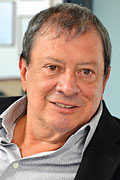Faces of Florida-Colombia Trade
Posted 12/3/2012

Design
» In Bogotá’s gritty industrial west side is the headquarters for Mario Hernandez, a Colombian designer of luxury handbags, suitcases and shoes. More than 350 people work at his headquarters, producing leather handbags from Italian leather stamped with Hernandez’s signature butterfly design. (The shoes and suitcases are made elsewhere.)
The designer, whose office is adorned with framed photos, letters and articles praising his company, including one of former President Bill Clinton, says his business grew 20% last year to $35 million. Established in 1978, Mario Hernandez now has nearly 50 stores in Latin America and Aruba. Hernandez says he wants to conquer Florida next.
Hernandez had a New York City store in the early 1990s and a Boca Raton location in the early-to mid-2000s. He says he is invigorated by the new free trade agreement with the United States and plans to make his third foray into the U.S. with a store in downtown Miami. “Miami is the gateway to America,” Hernandez says.
Architecture
» The push to invest in Colombia’s infrastructure has been lucrative for Miami’s Zyscovich Architects. The firm, which has its only overseas office in Bogotá, designed the new international and domestic terminals at El Dorado International Airport. The modern glass-walled international terminal opened in October with construction on the domestic terminal ending in 2014. Zyscovich is also involved in 13 other Colombia-related projects, from regional airports to schools. The firm has been working in Colombia for seven years, and 70% of its international revenue comes from Colombia. Bernard Zyscovich, the firm’s president, says the company has “strong roots” in the country, and one of the firm’s seven principals is Colombian. “We are looking at Colombia as a base to eventually get into other countries throughout South America and the Caribbean,” he says.
Restaurants
» Chain restaurant expansion is a two-way street. Two popular Colombian restaurants plan to open their first U.S. locations in south Florida. One, Crepes & Waffles, was started by two students. The chain plans a Miami location.
Meanwhile, El Corral, a Colombian-based hamburger chain, is moving north with a foray into the crowded U.S. burger market. The firm’s red-lettered signs are a familiar sight throughout Bogotá, where it now operates nearly 100 stores. Founded in 1983 in Bogotá, El Corral has another 78 locations elsewhere in Colombia, along with franchise locations in Panama, Chile and Ecuador. Its sit-down sister restaurant, El Corral Gourmet, has 15 sites in Colombia.
Over the next couple of months, the chain will open its first U.S. location, a franchise in the Doral area of Miami. Company executives see south Florida as an ideal test market because of its proximity and Hispanic population.
El Corral, says Fernando Sanchez, vice president of marketing, doesn’t want to be “just the burger for the ethnic market.” He is targeting customers willing to pay a little bit more for a high-quality burger, made to order with freshly prepared sides and locally sourced beef. (The Miami store will get its meat from Orlando.) That comes at a cost. A plain burger, fries and a drink purchased at El Corral’s Colombian locations is nearly $10.
The move isn’t risk-free. Another Colombian chain, the Juan Valdez Café coffee shop, closed its stand-alone stores in New York, Philadelphia, Seattle and Washington, D.C., by the end of 2010 after seven years. The company now focuses on its cafes at U.S. airports, including Miami International Airport.
Sanchez says El Corral will offer a Colombian burger that can compete against American burgers — featuring unusual condiments, such as pineapple. “It’s easy to make burgers, but our burgers are special,” Sanchez says.
Gems
» Bogotá jewelry designer Mercedes Salazar’s handmade bracelets and necklaces are sold in U.S. stores such as Nordstrom’s and Neiman Marcus, and online through Amazon. Salazar says she wants to establish her first U.S. store in Miami next year. Already, 20% of her revenue comes from U.S. sales. “Our pieces are not only for the Latino market,” Salazar says.
Food
» Executives at Pesquera Jaramillo, a seafood importer that has its own restaurants, say the new free trade agreement means the company can pass savings on to Colombian customers. It also plans to export seafood into the U.S. for the first time. Pesquera Jaramillo executives say they see potential in selling dishes like cazuela de mariscos, a type of soup, to U.S. retail stores and restaurants, beginning in Florida. “It’s a diverse country with a mix of cultures that is open to new products,” says operations manager Juan Camilo García. Without tariffs, their seafood pricing is more competitive.

» Alpina, a Colombian dairy company, established its U.S. headquarters in Miami and recently announced a manufacturing facility in New York. Its first U.S. product is a yogurt called Restart.
Agriculture
» Morey Moss smells one of Colombia’s biggest exports every day: Flowers. Moss owns Berkeley Florist Supply, a Miami-based wholesale florist. He has been in the business nearly 50 years and owns a 30,000-sq.-ft. warehouse and showroom. Moss says the free trade agreement was important because it helped ensure flowers stayed tariff-free. Colombia, which has dominated the flower industry for decades thanks to a high-altitude climate favorable to growing flowers and a cheap labor market, exports about 80% of its flowers to the U.S. Moss says Colombian flowers are good quality, with a long shelf life. The daily shipments of Colombian flowers to Florida’s airports is the reason why the nation’s largest wholesale florists have warehouses in the state.
